Related Research Articles

The Council of Europe is an international organisation founded in the wake of World War II to uphold human rights, democracy and the rule of law in Europe. Founded in 1949, it has 46 member states, with a population of approximately 675 million; it operates with an annual budget of approximately 500 million euros.

The European Court of Human Rights, also known as the Strasbourg Court, is an international court of the Council of Europe which interprets the European Convention on Human Rights. The court hears applications alleging that a contracting state has breached one or more of the human rights enumerated in the Convention or its optional protocols to which a member state is a party. The European Convention on Human Rights is also referred to by the initials "ECHR". The court is based in Strasbourg, France.
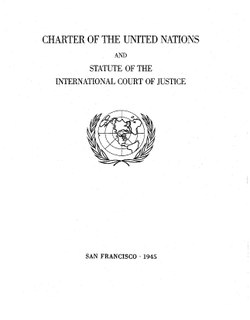
The Charter of the United Nations (UN) is the foundational treaty of the UN, an intergovernmental organization. It establishes the purposes, governing structure, and overall framework of the UN system, including its six principal organs: the Secretariat, the General Assembly, the Security Council, the Economic and Social Council, the International Court of Justice, and the Trusteeship Council.
International human rights law (IHRL) is the body of international law designed to promote human rights on social, regional, and domestic levels. As a form of international law, international human rights law are primarily made up of treaties, agreements between sovereign states intended to have binding legal effect between the parties that have agreed to them; and customary international law. Other international human rights instruments, while not legally binding, contribute to the implementation, understanding and development of international human rights law and have been recognized as a source of political obligation.

The United Nations Human Rights Council (UNHRC) is a United Nations body whose mission is to promote and protect human rights around the world. The Council has 47 members elected for staggered three-year terms on a regional group basis. The headquarters of the Council are at the United Nations Office at Geneva in Switzerland.
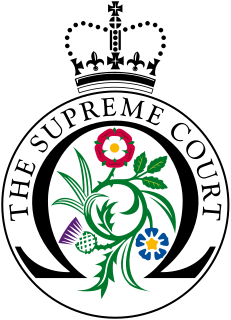
The Supreme Court is the final court of appeal in the United Kingdom for all civil cases, as well as for criminal cases originating in England, Wales and Northern Ireland. It also hears cases of the greatest public or constitutional importance affecting the whole population.
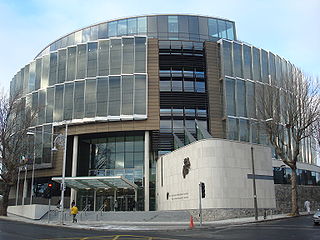
The Special Criminal Court is a juryless criminal court in Ireland which tries terrorism and serious organised crime cases.
The five techniques are illegal interrogation methods which were originally developed by the British military in other operational theatres and then applied to detainees during the Troubles in Northern Ireland. They have been defined as prolonged wall-standing, hooding, subjection to noise, deprivation of sleep, and deprivation of food and drink.
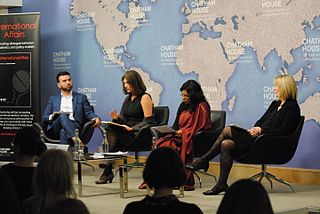
Fionnuala Ní Aoláin is an Irish academic lawyer specialising in human rights law.
The International Federation for Human Rights is a non-governmental federation for human rights organizations. Founded in 1922, FIDH is the second oldest international human rights organisation worldwide after Anti-Slavery International. As of 2016, the organization is made up of 184 member organisations including Ligue des droits de l'homme in over 100 countries.
The law of Northern Ireland refers to the legal system of statute and common law operating in Northern Ireland since the partition of Ireland established Northern Ireland as a distinct jurisdiction in 1921. Prior to 1921, Northern Ireland was part of the same legal system as the rest of Ireland.
Human rights in the Philippines are protected by the Constitution of the Philippines, to make sure that persons in the Philippines are able to live peacefully and with dignity, safe from the abuse of any individuals or institutions, including the state.

The European Union (EU) is a political and economic union of 27 member states that are signatories to the founding treaties of the union and thereby share in the privileges and obligations of membership. They have agreed by the treaties to share their own sovereignty through the institutions of the European Union in some, but not all, aspects of government. State governments must agree unanimously in the Council for the union to adopt some policies; for others, collective decisions are made by qualified majority voting. These obligations and sharing of sovereignty within the EU make it unique among international organisations, as it has established its own legal order which by the provisions of the founding treaties is both legally binding and supreme on all the member states. A founding principle of the union is the principle of subsidiarity, meaning that decisions are taken collectively if and only if they cannot realistically be taken individually.
Brice Dickson is a barrister from Northern Ireland and Professor of International and Comparative Law at the School of Law, Queen's University Belfast. Formerly Professor of Law at the University of Ulster, he became the first Chief Commissioner of the Northern Ireland Human Rights Commission (NIHRC) on its establishment in 1999, serving two three-year terms.
Martin O’Brien is a human rights activist and charity administrator in Northern Ireland.
A cross-community vote or cross-community support is a form of voting used in the Northern Ireland Assembly according to the provisions of the 1998 Good Friday Agreement. It requires the support of both main communities in Northern Ireland, in other words majority of unionists and the majority of nationalist members of the Assembly. Among other reasons, it arises when the petition of concern procedure is invoked.

An ombudsman, ombudsperson, ombud, ombuds, or public advocate is an official who is usually appointed by the government or by parliament but with a significant degree of independence. In some countries, an inspector general, citizen advocate or other official may have duties similar to those of a national ombudsman and may also be appointed by a legislature. Below the national level, an ombudsman may be appointed by a state, local, or municipal government. Unofficial ombudsmen may be appointed by, or even work for, a corporation such as a utility supplier, newspaper, NGO, or professional regulatory body.
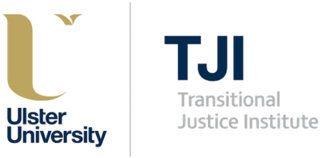
The Ulster University's Transitional Justice Institute (TJI), is a law-led multidisciplinary research institute of Ulster University which is physically located at the Jordanstown, and Magee campuses. It was created in 2003, making it the first and longest-established university research centre on this theme. In the 2014 Research Excellence Framework (REF) Law at Ulster University was ranked 4th overall in the UK. Ulster was ranked first for impact in law with 100% of impact rated as world-leading, the only University to achieve this in law.

The Criminal Justice Act 1998 is a law passed in the United Kingdom, which came into force on 4 September 1998. It stipulated that it is an offense to participate in a conspiracy to carry out a course of conduct that leads to an offense in another jurisdiction. It gave courts in England and Wales the authority to try conspiracies to commit offences abroad. The law also provided stricter punishment for being a member of a terror group. Parts of it were replaced by the Terrorism Act 2000 and the Proceeds of Crime Act passed in 2002.
References
- ↑ "CAJ becomes a full member of the International Federation for Human Rights". Just News. September 2016. See http://www.caj.org.uk/files/2016/10/20/JustnewsSeptember_October.compressed_.pdf Archived 2016-11-24 at the Wayback Machine